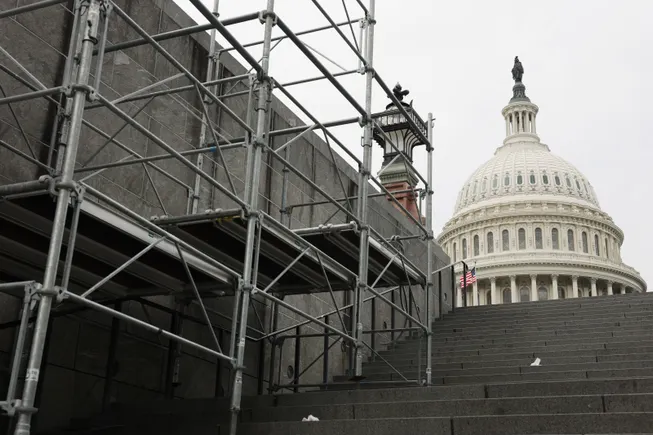Contractors across the country are measuring the potential impact of a government shutdown. A meeting Monday between President Donald Trump and congressional leaders didn’t result in an agreement between the parties.
The federal government will shut down Wednesday, Oct. 1, if Congress fails to reach a funding deal. Such a stoppage will freeze construction activity immediately on certain sites, both temporarily and in some cases permanently.
The first pain point will be on projects that rely entirely on federal dollars, said Marsia Geldert-Murphey, a former president of the American Society of Civil Engineers and current senior associate at GBA, a Lenexa, Kansas-based AEC firm. Though money could be technically in place, a shutdown could still sideline contracting officers and other oversight staff.
That could leave projects stuck in neutral, Geldert-Murphey told Construction Dive.
“The real problem is going to be the federal employees,” said Geldert-Murphey. “Are they going to be furloughed? In many cases, we can’t move forward with the project if the federal oversight is not there.”
While projects in progress are typically allowed to move forward, any activities that require input or approval from government employees simply cannot proceed, said Erik Wright, principal at Precision Construction Services, a San Luis Obispo, California-based contractor. He added that delays are more likely than cancellations in these instances.
“When the government shut down in late 2018, early 2019 for around 20 working days, projects in the final stages of contracting or early stages of construction were delayed three to four months,” Wright told Construction Dive. “We had contracts in process late in 2018 that didn’t end up coming through until April and May of 2019, which presented significant cash flow and staffing challenges for us.”
Being in a state of limbo would have immediate effects on contracts and supply chains. Prices are locked for only so long, and prolonged delays force suppliers to reprice bids and contractors to remobilize crews at added cost, she said.
Fixed-price contracts
On the other hand, existing fixed-price contracts with appropriated funds should be allowed to continue, according to Associated General Contractors of America. Most federal construction contracts are within this category, as “they were already awarded on a fixed-price basis and funding was appropriated at the time of the award,” according to an emailed AGC statement shared with Construction Dive. That includes projects funded by the Infrastructure Investment and Jobs Act, as well as the Highway Trust Fund, according to AGC.
For example, all projects sponsored by the Federal Highway Administration and Federal Transit Administration shouldn’t be impacted, since they’re not subject to annual appropriations; they should continue to operate as normal, according to AGC. In other words, these agencies should continue to make timely payments to contractors on work performed, regardless of a government shutdown.
But cost-type contracts and awards still in the pipeline are far more exposed to the fallout of a shutdown, should one happen. State and local private construction tied to federal projects would also likely face obstacles, added Geldert-Murphey.
“If the federal project is delayed and you’re assuming that you’re going to be building connecting to something that’s already built, the cascading effect can be devastating,” Geldert-Murphey told Construction Dive. “If they [contractors] don’t have that communication on the federal side, you’re at a standstill, which is again, a domino effect of pushing back decisions that are being made.”
Many state, municipal and nonprofit projects rely on federal grants, said Wright, meaning that a public shutdown could discourage private clients from moving ahead with capital projects as well.
“The construction supply chain is tightly interconnected, so if federal infrastructure or defense work slows, demand volatility for materials and subcontractors will spread beyond federal jobs,” Wright told Construction Dive. “Repeated shutdowns erode confidence in the government as a reliable contracting partner, which can influence how firms price future bids and whether they pursue certain opportunities at all.”
At Messer Construction, a Cincinnati-based contractor, Paul Richter echoed these concerns.
“A prolonged shutdown lasting several months could potentially stunt progress for planning and development of future projects, leading to a disruption to the flow of work on a longer-term horizon,” Richter, the operations vice president, told Construction Dive.
The firm’s military projects are largely insulated in the short-term, Richter said, because funding through the Military Construction program or Operations and Maintenance accounts is typically locked in well in advance. The risk stems from facility staff who may be sent home, which would prevent renovation projects from moving forward. Richter added that a lengthy shutdown would hinder future work as well.
That uncertainty, ultimately, will hamstring construction activity once again.
“Any government shutdown creates uncertainty … including potential delays in federal infrastructure projects,” Kristen Swearingen, ABC vice president of government affairs, told Construction Dive. “ABC urges Congress and the president to find a better way forward.”
View the original article and our Inspiration here


Leave a Reply